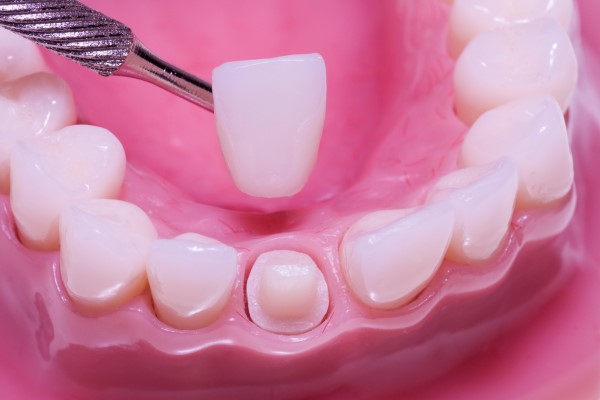3 Tips To Help Dental Crowns Last Longer

How long dental crowns last depends on how well you take care of them. A crown is expected to last about 15 years, but with the proper care, it could last twice as long. If a crown eventually does wear out, you need to have a replacement because the tooth underneath has been permanently altered. Therefore, if you can prolong the life of your crowns through proper care, it means you need fewer replacements, meaning that you spend less money on the treatment over time.
What do dental crowns do?
If a tooth is weakened by damage or decay, a dental crown fits on top of it to strengthen it. Crowns are tooth-shaped and often tooth-colored. They are made of strong materials so that they can function in the mouth nearly as well as a natural tooth.
For a patient to be a good candidate for a crown, the tooth can have extensive damage but must still retain a healthy root below the gumline. On the day of the procedure, any diseased or damaged dental tissues are removed or treated. The tooth is ground down to the shape of a smaller cube or cylinder. This will allow plenty of room and surface area for attaching the new tooth cap.
Impressions or scans are taken and sent to a lab to craft the dental crown. This data helps ensure that the finished product is the right size, shape, and color to better match the surrounding natural teeth. While the final crown is being milled offsite, a dentist will place a temporary crown to last for the next few weeks.
Some dental offices offer same-day crowns. In these situations, a milling machine is present at the office and the final crown is milled and mounted on the same day during the same visit. Both traditional and same-day crowns offer the same durability and longevity because they are made from the same materials.
What can you do to help dental crowns last longer?
There are several things that you can do to prolong the life of your crowns.
1. Protect your teeth
Sudden force or prolonged pressure on your crowns can damage them to the point that they need to be replaced sooner than you expect. If you participate in contact sports or other strenuous physical activities, you may want to wear a mouthguard to protect both your crowns and your natural teeth from sudden impact. Sports injuries can cause significant oral health problems.
However, it is not only sudden trauma that you have to worry about. Many people grind and clench their teeth while they sleep. Grinding your teeth exerts more than 200 pounds of pressure per square inch. Over time, this can cause your crowns to wear out more quickly. Because it happens while you are sleeping, you may not be aware you are doing it. However, you can prevent grinding your teeth by wearing a special mouth guard designed to be used when sleeping.
2. Perform excellent oral hygiene
In terms of oral hygiene, you do not necessarily have to do anything different to take proper care of your crowns if you are already flossing daily and brushing twice daily. However, it becomes more important to adhere consistently to your oral hygiene routine when you have crowns. Food particles could get stuck between the crown and the adjacent teeth, and although crowns do not decay, the other teeth can. Plaque could also form along the gum line, which could put you at risk for periodontal disease and potentially affect the tooth under the crown.
3. Avoid bad habits
Crowns are very strong, but they are not impervious to damage. You could break crowns, as well as your natural teeth, by chewing on ice or other hard objects, such as your fingernails or pencils and pens, or using them as a tool to open bottles and other packages.
Generally speaking, you should try to avoid eating candy because the sugar it contains can promote tooth decay. In particular, avoid candies that are hard enough to potentially crack or chip your crowns and sticky candies that could pull them off.
Conclusion
Dental crowns are expected to last for more than a decade. They can endure even longer with the proper care. Brush and floss your teeth daily, avoid foods and habits that can damage crowns, and see your dentist on a routine basis for checkups and cleanings.
Request an appointment here: https://serenitydentalspa.com or call Serenity Dental Spa at (415) 576-9400 for an appointment in our San Francisco office.
Check out what others are saying about our dental services on Yelp: Dental Crowns and Dental Bridges in San Francisco , CA.
Related Posts
Dental crowns come in a range of material options, including zirconium and porcelain. These materials vastly increase the aesthetics and reliability of dental crowns as compared to past alternatives. Regardless of the material, most dental crowns look and work well. However, there are some significant variations between these options to be aware of. This article…
Dental crowns are incredibly useful for tooth restoration because they can fix various aesthetic defects and restore strength to teeth that have been weakened by decay or injuries. One of the most important advantages of crowns is their longevity; with good treatment, your new crowns will last a long time. Knowing what precautions to take…
A dental crown can help to fix a variety of dental issues like chipped, cracked, broken, decayed, or deformed teeth. The crown covers up the visible part of the tooth and restores its function. Getting a dental crown placed on a tooth typically involves two trips to the dentist. The first is used to prepare…
Dental crowns can restore your natural smile and dental function. Many individuals suffer from low self-esteem due to their teeth condition, but this improves when they get dental crowns. However, these crowns are not inexpensive, and you must keep them in good shape to ensure that they last a long time. Dental crowns will last…


